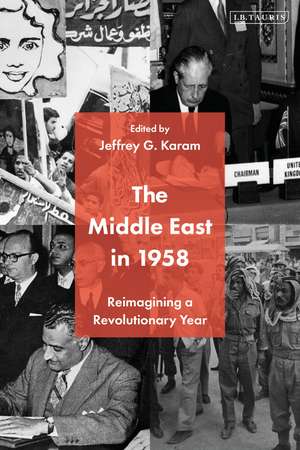The Middle East in 1958: Reimagining a Revolutionary Year
Editat de Jeffrey G. Karamen Limba Engleză Hardback – 16 sep 2020
Preț: 598.52 lei
Preț vechi: 858.63 lei
-30% Nou
Puncte Express: 898
Preț estimativ în valută:
114.52€ • 119.57$ • 94.79£
114.52€ • 119.57$ • 94.79£
Carte tipărită la comandă
Livrare economică 04-18 aprilie
Preluare comenzi: 021 569.72.76
Specificații
ISBN-13: 9781788319423
ISBN-10: 1788319427
Pagini: 248
Ilustrații: 12 b/w illus
Dimensiuni: 156 x 234 x 22 mm
Greutate: 0.53 kg
Editura: Bloomsbury Publishing
Colecția I.B.Tauris
Locul publicării:London, United Kingdom
ISBN-10: 1788319427
Pagini: 248
Ilustrații: 12 b/w illus
Dimensiuni: 156 x 234 x 22 mm
Greutate: 0.53 kg
Editura: Bloomsbury Publishing
Colecția I.B.Tauris
Locul publicării:London, United Kingdom
Caracteristici
Previous work has focused on the Middle East in 1958 from an American and British perspective, while this new book examines the subject in its global, regional and local contexts
Notă biografică
Jeffrey G. Karam is an Assistant Professor of Political Science at the Lebanese American University. He is also an Associate at Harvard University's Middle East Initiative. He is the author of several articles, book chapters, and policy briefs on U.S. intelligence and foreign policy in the Middle East. He is the recipient of several awards, including the Christopher Andrew-Michael Handel Prize for the best article in Intelligence and National Security in 2017.
Cuprins
Foreword: Salim Yaqub, University of California, Santa BarbaraChapter 1: Reimagining 1958 Through the Lenses of Multilingual Sources and Interdisciplinary Perspectives, Jeffrey G. Karam, Lebanese American UniversityPart 1 - The Regional and International Context of 1958: Declining and Rising Powers in the Middle EastChapter 2: The Point of Departure: The Impact of the Revolutionary Year of 1958 on British Policy, Robert McNamara, Ulster UniversityChapter 3: France and the Middle East in 1958: Continuity and Change Through Crisis, Sofia Papastamkou, French National Centre for Scientific Research (CNRS), University of Lille.Chapter 4: Cautious Revisionism and the Limits of Hegemony in 1958: A Revolutionary Year for the United States in the Middle East, Jeffrey G. Karam, Lebanese American UniversityChapter 5: The 'Partisans of Peace' Between Baku and Moscow: The Soviet Experience of 1958, Elizabeth Bishop, Texas State University-San Marcos Part 2 - Rivalry and Alliances between Arab and Non-Arab States: Regionalizing Dynamics of the Cold War Chapter 6: Saudi Arabia in the Crucible of 1958, Nathan Citino, Rice UniversityChapter 7: Egypt's Revolutionary Year: Regime Consolidation at Home, Pragmatism Abroad, and Neutralism in the Cold War, Dina Rezk, University of ReadingChapter 8: The Outsider Inside: Turkey and the Domino Effect of Arab Nationalism in 1958, Murat Kasapsaraçoglu, Antalya Bilim UniversityChapter 9: Creating the 'Island of Stability': Iran, the Cold War, and American Cultural Diplomacy at the End of the 1950s. John Ghazvinian, University of Pennsylvania Part 3 - Connecting the Local to the Global: Revolutions, Wars, and Coups in the Middle EastChapter 10: How about 1958 in Algeria? A Transnational Event in the Context of the War of Independence, Sylvie Thénault, French National Centre for Scientific Research, University of Paris 1 Pantheon-SorbonneChapter 11: The Iraqi Revolution of 1958: Its Historic Significance and Relevance for the Present, Juan Romero, Western Kentucky UniversityChapter 12: No Turning Back: Syria and the 1958 Watershed, Fadi Esber, London School of Economics and Political ScienceChapter 13: The Crisis of 1958 in Lebanon: Political Rivalries, Caroline Attie, Dar al Hekma UniversityChapter 14: Evolution and Revolution: Jordan in 1958, Clea Hupp, Syracuse UniversityChapter 15: Reflections and Conclusions from the Revolutionary Year of 1958, Jeffrey G. Karam, Lebanese American University
Recenzii
With perceptiveness and authority, with impressive command of exciting new sources and methodologies, The Middle East in 1958 illuminates this six-decades-old history, establishing its resonance and relevance for a new generation of readers
Jeffrey G. Karam's The Middle East in 1958 is an impressive examination of a revolutionary year whose impact still reverberates today. Drawing on a range of archival sources, Karam's volume benefits from the latest research by leading scholars. Its regional and global approach to the tumultuous events of 1958 makes it ideal for graduate and undergraduate courses.
The Middle East in 1958 examines one of the most transformative critical junctures in the political history of the region. This expertly edited volume shows how the examination of 1958 is relevant and timely to our understanding of current regional dynamics. The Middle East in 1958 not only significantly expands our understanding of some of the most vital historical events that shaped the current structure of the region, it paves the way for producing more relevant historical knowledge by using innovative methodologies and multilingual sources.
'By widening their focus and digging deeper into the archives Jeffrey G. Karam and his colleagues have new things to say about a pivotal moment in the politics of the Middle East.'
Jeffrey G. Karam's The Middle East in 1958 is an impressive examination of a revolutionary year whose impact still reverberates today. Drawing on a range of archival sources, Karam's volume benefits from the latest research by leading scholars. Its regional and global approach to the tumultuous events of 1958 makes it ideal for graduate and undergraduate courses.
The Middle East in 1958 examines one of the most transformative critical junctures in the political history of the region. This expertly edited volume shows how the examination of 1958 is relevant and timely to our understanding of current regional dynamics. The Middle East in 1958 not only significantly expands our understanding of some of the most vital historical events that shaped the current structure of the region, it paves the way for producing more relevant historical knowledge by using innovative methodologies and multilingual sources.
'By widening their focus and digging deeper into the archives Jeffrey G. Karam and his colleagues have new things to say about a pivotal moment in the politics of the Middle East.'
